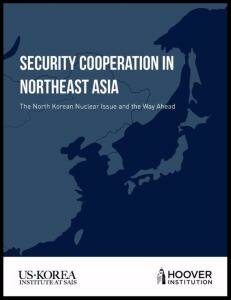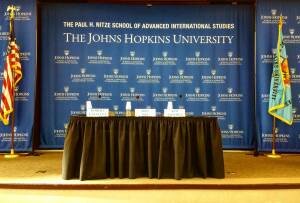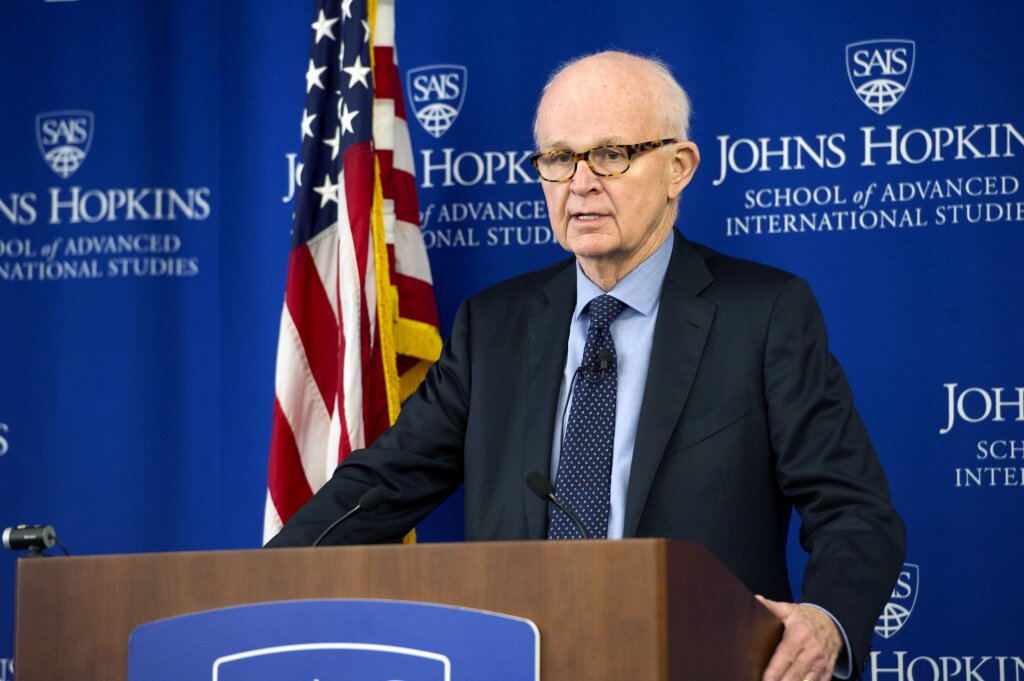Published on October 7, 2016

North Korea conducted its fifth and most powerful nuclear test in September 2016. It is also making significant progress on its delivery systems, rapidly expanding its stockpile of fissile materials, and steadily improving on its nuclear weapon designs. There is growing concern that if this process continues, North Korea could soon become a clear and present danger not only to Northeast Asia, but also to the United States.
With this in mind, the US-Korea Institute at SAIS partnered with the Hoover Institution at Stanford University to convene some of the leading experts on Northeast Asia security issues to take stock of the issue and consider what steps can be taken to stabilize the situation and halt North Korea’s development of weapons of mass destruction. The two-day conference was held at Stanford University in mid-June and was co-chaired by former Secretary of State George P. Shultz and former Secretary of Defense William J. Perry.
The following report is a summary of the main points discussed by the participants, with the primary takeaway that there is a need for a comprehensive policy review along the lines of the “Perry Process” fifteen years ago.
Download the report, “Security Cooperation in Northeast Asia: The North Korean Nuclear Issue and the Way Ahead”
Published on September 15, 2016
The US-Korea Institute at SAIS and
The Presidential Committee for Unification Preparation present
The Evolving Regional Architecture in Northeast Asia:
Maintaining Strong US-Korea Relations with the Next US Administration

Click here to watch the recorded event.
Published on April 14, 2016
Published on February 23, 2016
The U.S.-Korea Institute at SAIS and Asia Policy Point present
Unfinished Apologies:
Imperial Japan’s Sex Slaves of Wartime Asia
March 1, 2016
9:00 AM – 3:00 PM
Kenney Auditorium
1740 Massachusetts Ave. NW
Washington, DC 20036
The US-Korea Institute at SAIS and Asia Policy Point invite you to attend a discussion on the unexamined and unresolved history of Imperial Japan’s system of sex slavery in wartime Asia. The panels will provide an overview of how the system came to be and how it was managed, discuss new research on the non-Korean Comfort Women, and bring the legacy of the Comfort Women system into contemporary understandings of conflict resolution and violence against women in warfare settings.
Panel 1: Framing the Comfort Women History – Japanese Comfort Women and their Antecedents
- Caroline Norma, lecturer in the Master of Translating and Interpreting degree in RMIT’s School of Global, Urban and Social Studies, Melbourne, Australia
- Discussant: Katharine H.S. Moon, SK-Korea Foundation Chair in Korea Studies and senior fellow at the Brookings Center for East Asia Policy Studies
Panel 2: The Comfort Women of Japan’s Occupied Asia
- Griselda Molemans, Dutch researcher and investigative journalist, founder of the Task Force for Dutch Indies War Reparations (Dutch acronym: TFIR; Task Force Indisch Rechtsherstel)
- Hilde Janssen, Dutch Journalist and author Schaamte en Onschuld[Shame and Innocent] and Troostmeisjes/Comfort Women
- Peipei Qiu, Professor of Chinese and Japanese on the Louise Boyd Dale and Alfred Lichtenstein Chair, Vassar College
- Evelina Galang, Professor of English, University of Miami
- Caroline Norma, RMIT, Melbourne, Australia
- Moderator: Yukiko Hanawa, Department of East Asian Studies, New York University
Keynote: Women in warfare, how far have we come?
- Taina Bien-Aimé, Executive Director, Coalition Against Trafficking in Women
Book signing with authors:
- Caroline Norma, The Japanese Comfort Women and Sexual Slavery during the China and Pacific Wars
- Peipei Qiu, Chinese Comfort Women: Testimonies from Imperial Japan’s Sex Slaves
- M. Evelina Galang, Angel de la Luna and the 5th Glorious Mystery
- Hilde Janssen, Troostmeisjes/Comfort Women
- Margaret Stetz, Legacies of the Comfort Women of World War II
Please RSVP here:
https://uskoreainstitute.org/events/unfinishedapologies/
The event will be webcast here.
Published on February 23, 2016

Ambassador Stephen Bosworth, 1939-2016. (Photo: Kaveh Sardari/USKI)
Ambassador Stephen Warren Bosworth died of pancreatic cancer in his home in Boston on Monday, January 4, 2016.
Stephen Bosworth was a career American diplomat and was chairman of the U.S.-Korea Institute at Johns Hopkins School of Advanced International Studies (SAIS) and held an appointment as a Senior Fellow at the Belfer Center for Science and International Affairs at the Harvard Kennedy School of Government. He was also served as the Payne Lecturer at the Freeman Spogli Institute at Stanford University in 2014.
Ambassador Bosworth served as Dean of The Fletcher School of Law and Diplomacy at Tufts University from 2001-2013. His administration at Fletcher is credited with increasing the size of the Fletcher faculty and student body while securing the financial soundness of the school during a period of economic uncertainty. He oversaw the creation of new degree programs that have significantly expanded the scope of The Fletcher School’s teaching, research, and global outreach. During his tenure as Dean at the Fletcher School, Ambassador Bosworth also served President Obama and Secretary of State Hillary Clinton as United States Special Representative for North Korea Policy from 2009 to 2011.
“Stephen Bosworth was among the best diplomats of his generation. A consummate professional and a student of history, he managed American foreign policy skillfully at critical junctures and left an indelible imprint on America’s policy toward Asia,” said Vali Nasr, dean of Johns Hopkins SAIS, “He was a transformational dean at the Fletcher School at Tufts University where he oversaw development of new programs. Insightful, kind and considerate, he was a great influence on friends and colleagues and generations of students who studied international affairs.”
read more …
Published on March 1, 2016




